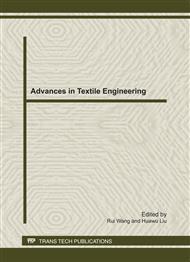p.551
p.555
p.561
p.566
p.570
p.574
p.578
p.582
p.586
Research on Consumer Motivation for Luxury Products in China
Abstract:
Chinese people who have become well off are experiencing a shift of consumption concept from traditional and practical style to luxurious style. It is time to understand the Chinese consumption demand and behavior in luxury products. Based on the previous researches and by way of intensive talks and questionnaire survey, this article takes advantage of Statistical Product and Service Solutions (SPSS) to conduct factor analysis, then to conclude the consumer motivation for luxury products in China as four main factors: “active social motivation”, “passive social motivation”, “desirable personal motivation”, and “hedonistic personal motivation”.
Info:
Periodical:
Pages:
570-573
DOI:
Citation:
Online since:
September 2011
Authors:
Keywords:
Price:
Сopyright:
© 2011 Trans Tech Publications Ltd. All Rights Reserved
Share:
Citation:


